How to Protect and Remove Chlorine From Your Hair, Skin and Suit
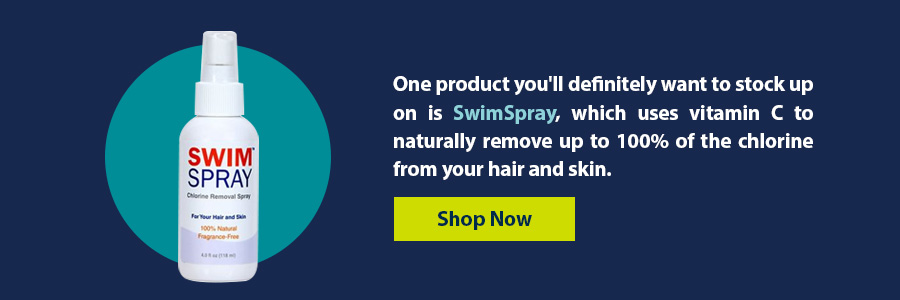
Swim Tips, Kiefer News
|
October 24, 2022
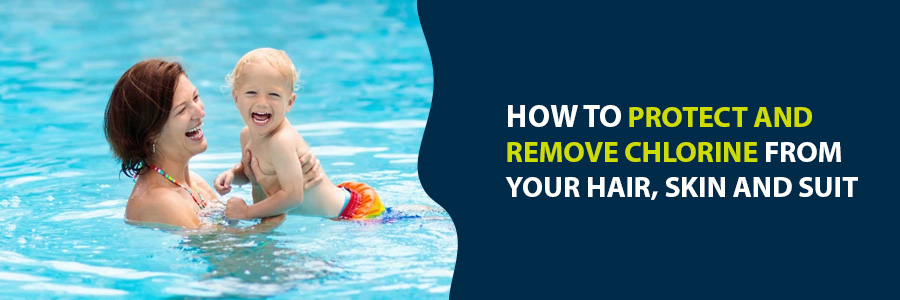
How to Protect and Remove Chlorine From Your Hair, Skin and Suit
One of the best things about summer is getting to cool off in the pool. Whether you have a pool at your home or you like to make trips to a public pool, there's one thing they all have in common: chlorine. Chlorine is a chemical that helps keep pools safe, so you don't come away from a swim having been exposed to dangerous biological contaminants. This is especially important in public pools since you never know what viruses or germs people may introduce into the water. While chlorine is a necessary means of making swimming in pools a safe activity, it can also cause some problems. If you've ever noticed those days at the pool are leaving your skin and hair dry and your favorite suit faded or frayed, chlorine is likely to blame. Don't worry, though. We're going to discuss some effective ways to protect your hair, skin and suit from chlorine before you swim and how to remove the chlorine after. Follow our tips, and you'll be able to enjoy plenty of afternoons at the pool without dealing with the potentially damaging effects of chlorine.Why You Should Protect Your Skin, Hair and Suit From Chlorine
Chlorine is necessary to keep water disinfected. That way, you can enjoy swimming safely without worrying about being exposed to bacteria like E. coli. However, even though chlorine helps you stay safe and healthy when you're swimming, it can cause problems for your skin, hair and swimsuit. Before we discuss the best ways to protect yourself from chlorine and remove it after a swim, let's take a look at the reasons why you should be concerned about chlorine exposure. Chlorine can adversely affect your skin, hair and bathing suit in the following ways:- Effects of chlorine on your hair: Chlorine deprives your hair of the natural oils that otherwise keep it soft and healthy. If you have repeated exposure to chlorine, the problem will be compounded, and your hair may become dry and brittle. Another problem is that, if your hair has been color-treated, chlorine can cause the color to fade.
- Effects of chlorine on your skin: When it comes to your skin, chlorine can leave you feeling dry, itchy and sensitive. This is because chlorine strips away the natural oils that protect your skin and keep it moist. Some people are more sensitive to chlorine than others, so you could experience more severe symptoms of irritation. Repeated chlorine exposure can eventually lead to fine lines and wrinkles on the skin.
- Effects of chlorine on your suit: It isn't just your body that's affected by chlorine. Chlorine can also take a toll on your bathing suit. It forms hypochlorite when combined with water, which fades the color of your suit over time and can even cause the fabric to fray and disintegrate. For many people, the idea of losing their favorite swimsuit too quickly due to chlorine eating away at it is disheartening, to say the least.
How to Protect Your Hair From Chlorine
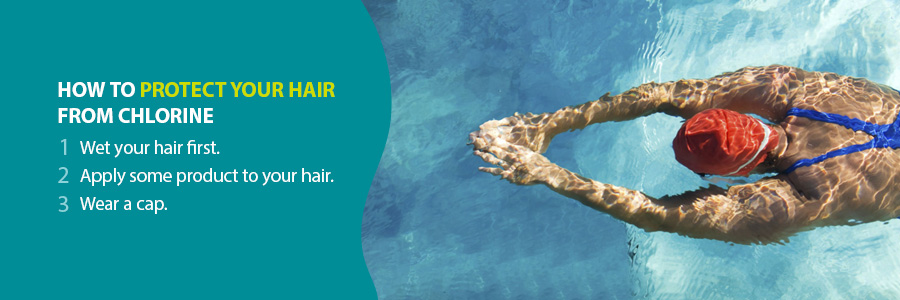 You can curb the negative effects of chlorine on your hair by making some simple preparations before you jump into the pool. There are three main ways you can protect your hair from soaking up too much chlorine:
You can curb the negative effects of chlorine on your hair by making some simple preparations before you jump into the pool. There are three main ways you can protect your hair from soaking up too much chlorine:
- Wet your hair first: One way is to wet your hair down before you start swimming. This may sound silly since you're about to get your hair wet in the pool. The reason this helps is because your hair soaks up water, almost like a sponge. So, saturating your hair with water in the shower first will keep it from soaking up as much chlorine in the pool.
- Apply some product to your hair: Another way you can prevent chlorine-damaged hair is by applying some product to it before swimming. You can use any oil or silicone-based product, such as a deep conditioner, anti-frizz serum or heat-protection spray. If you don't own hair products like this or would prefer a more natural alternative, you can use coconut oil. Applying product to your hair will create a barrier of protection from chlorine.
- Wear a cap: You may be used to seeing Olympic swimmers wear latex or silicone swim caps to keep their hair out of their faces and help enhance their aerodynamics. Swim caps can also be an effective way to protect your hair from chlorine. It won't keep your hair completely dry, but it will add a layer of protection that significantly reduces the effect chlorine in the pool will have on your hair.
How to Protect Your Skin From Chlorine
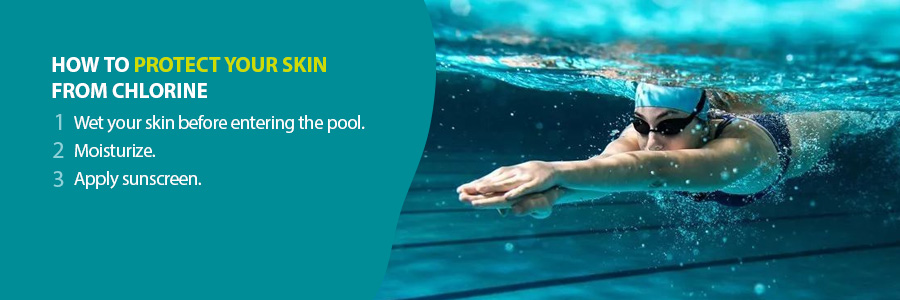 Just like your hair, your skin can also suffer from exposure to chlorine. Protecting your skin should start before you head to the pool. The key is to add a layer of protection to lock in moisture and keep chlorine from soaking into your skin too much. Try these methods to protect your skin:
Just like your hair, your skin can also suffer from exposure to chlorine. Protecting your skin should start before you head to the pool. The key is to add a layer of protection to lock in moisture and keep chlorine from soaking into your skin too much. Try these methods to protect your skin:
- Wet your skin before entering the pool: Your skin is absorbent, just like your hair, so the same principle we mentioned earlier applies here as well. If you rinse off with fresh water before you get into the pool, your skin won't soak up as much chlorinated water. Rinsing off before you get into the pool will also ensure you don't have any sweat on your body that could react with the chlorine and form chloramine.
- Moisturize: Rubbing a natural oil into your skin is a good way to ensure the chlorine doesn't strip it of too much moisture. Some examples of natural oils you could use are coconut, argon, avocado, almond and jojoba. You can also apply lotion to your skin. As we'll see in the next section, you should also follow up with lotion after you get out of the pool.
- Apply sunscreen: Waterproof sunscreen is a must if you're planning to swim outdoors, but it can do more than just protect you from the sun. Sunscreen can also protect your skin from chlorinated water. Make sure you reapply the sunscreen as often as needed if you're outside for a long period of time so you don't burn.
How to Protect Your Suit From Chlorine
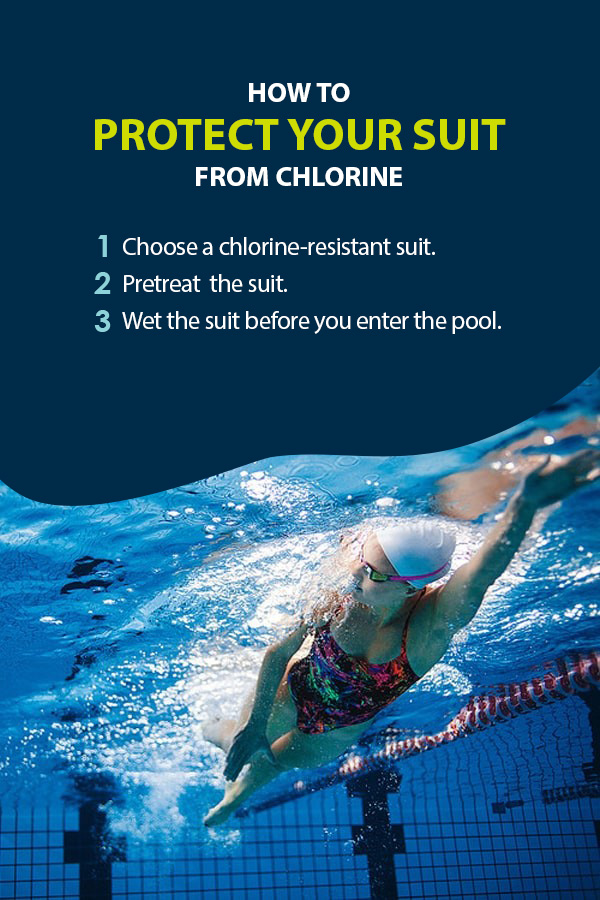 Your bathing suit can also suffer from exposure to chlorine. The color can fade, and the fabric can break down. There are some ways you can prevent this, though. Try following these tips:
Your bathing suit can also suffer from exposure to chlorine. The color can fade, and the fabric can break down. There are some ways you can prevent this, though. Try following these tips:
- Choose a chlorine-resistant suit: If you are a serious swimmer, you may want to consider purchasing a suit that is specially engineered to be chlorine-resistant. These suits don't repel chlorine, but they are made from fabrics that are less absorbent. The fabric is also more durable, so the suit should hold up better over time.
- Pretreat the suit: When you purchase a new suit, regardless of the material it's made out of, you should pretreat it before you wear it the first time. Pretreating your suit helps to lock in the colors so it will be less likely to fade. You can pretreat your suit by letting it soak in a solution of water mixed with a teaspoon of sodium ascorbate, which is a type of vitamin C.
- Wet the suit before you enter the pool: Each time before you swim, you should rinse off first in fresh water, which contains far less chlorine than pool water. Saturating the suit with fresh water first will keep it from soaking up as much chlorinated water.
How to Remove Chlorine From Your Skin, Hair and Suit
As we've seen, there are ways you can protect yourself from chlorine in order to minimize its effects. However, a dip in the pool will inevitably leave you with some chlorine clinging to your skin, hair and bathing suit. This is because chlorine bonds on a molecular level to the proteins in your hair and skin and to the fibers in your swimsuit. While people often prioritize rinsing off after getting out of the pool, rinsing off or even showering with soap isn't enough to strip the chlorine from your body. The only way to actually remove chlorine is with a vitamin C-based chlorine removal product. SwimSpray, an all-natural chlorine removal spray, is the best chlorine removal product on the market by far for your hair and skin. To use this product, you should follow up rinsing your skin and hair by spraying both with SwimSpray. The vitamin C formula neutralizes chlorine quickly. You can then wash with soap and use your favorite shampoo and other products on your hair. To remove chlorine from your suit after you've gotten back from swimming, soak it in a swimsuit cleaner like Suit Solutions. The cleaner is specially designed to neutralize chlorine to keep your suit smelling fresh and to keep the fabric from stretching and breaking down. If you want your suit to last longer and don't want it to smell like chlorine the next time you put it on, be sure to use Suit Solutions consistently.Enjoy Your Time in the Pool With Products From Kiefer
Whether you're a professional swimmer or just someone looking forward to fun and relaxing summer days in the pool, Kiefer has all the products you need. This includes products to protect your hair, skin and suit from chlorine. One product, in particular, you'll definitely want to stock up on is SwimSpray, which uses vitamin C to naturally remove up to 100% of the chlorine from your hair and skin. You'll be amazed at how much better your skin and hair will feel without chlorine sticking around. Browse through our other personal care products for more ways to keep yourself protected from the effects of chlorine. With help from Kiefer, you'll be ready to dive into the pool this summer!




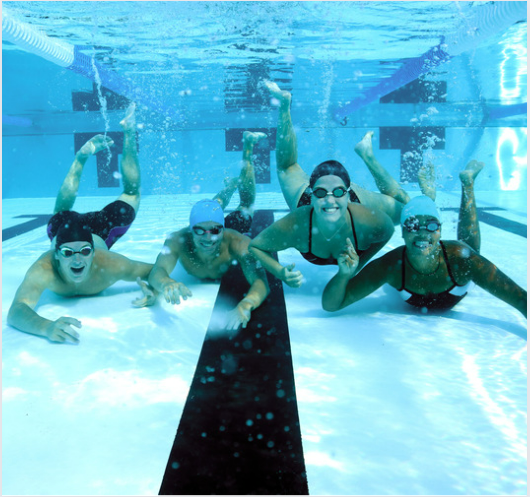
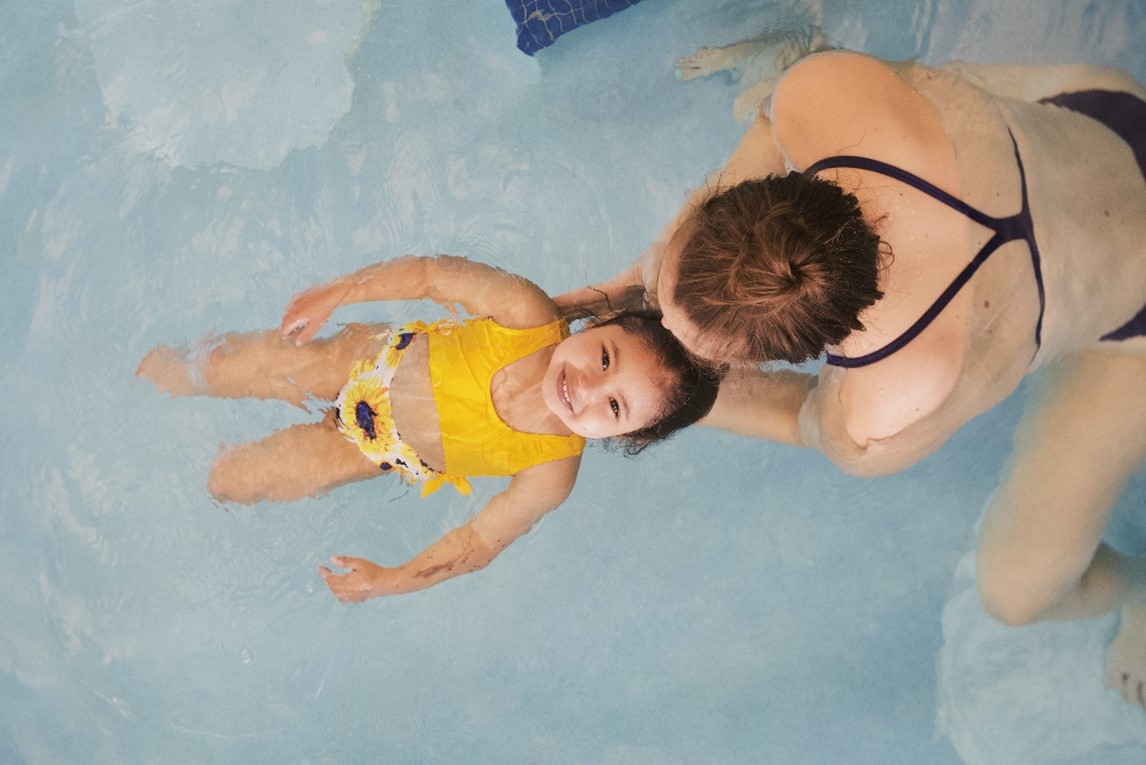

Leave a Comment
Your email address will not be published. Required fields are marked *